Amongst The Rubble: A Look at the Christchurch earthquake from the Bottom Up, October 2010
Statement on Canterbury earthquake disaster, February 2011
Class imbalance will determine nature of Christchurch recovery, July 2011

Just another WordPress site
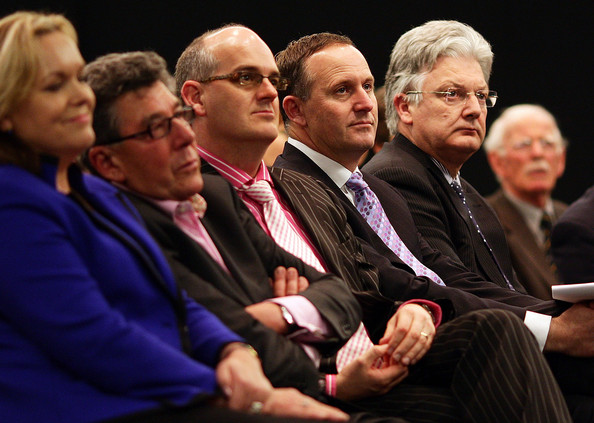
Ian Anderson
The National government has introduced plans to sell 49% shares in state-owned enterprises to private investors. Many on the left call for “New Zealand ownership,” but the real issue here is corporatisation of resources; whether by Kiwi or international investors.
National describes their plans as a “mixed ownership model,” claiming they’ll cap investment by any one company at 10%, and that 85-90% of shares will be held by Kiwi “mum and dad” investors. However investigation by the Ombudsman reveals that Treasury has no evidence for these claims. Only a small minority of investors will benefit from these sales. Continue reading “State-owned assets: No to confiscation, yes to collective control”
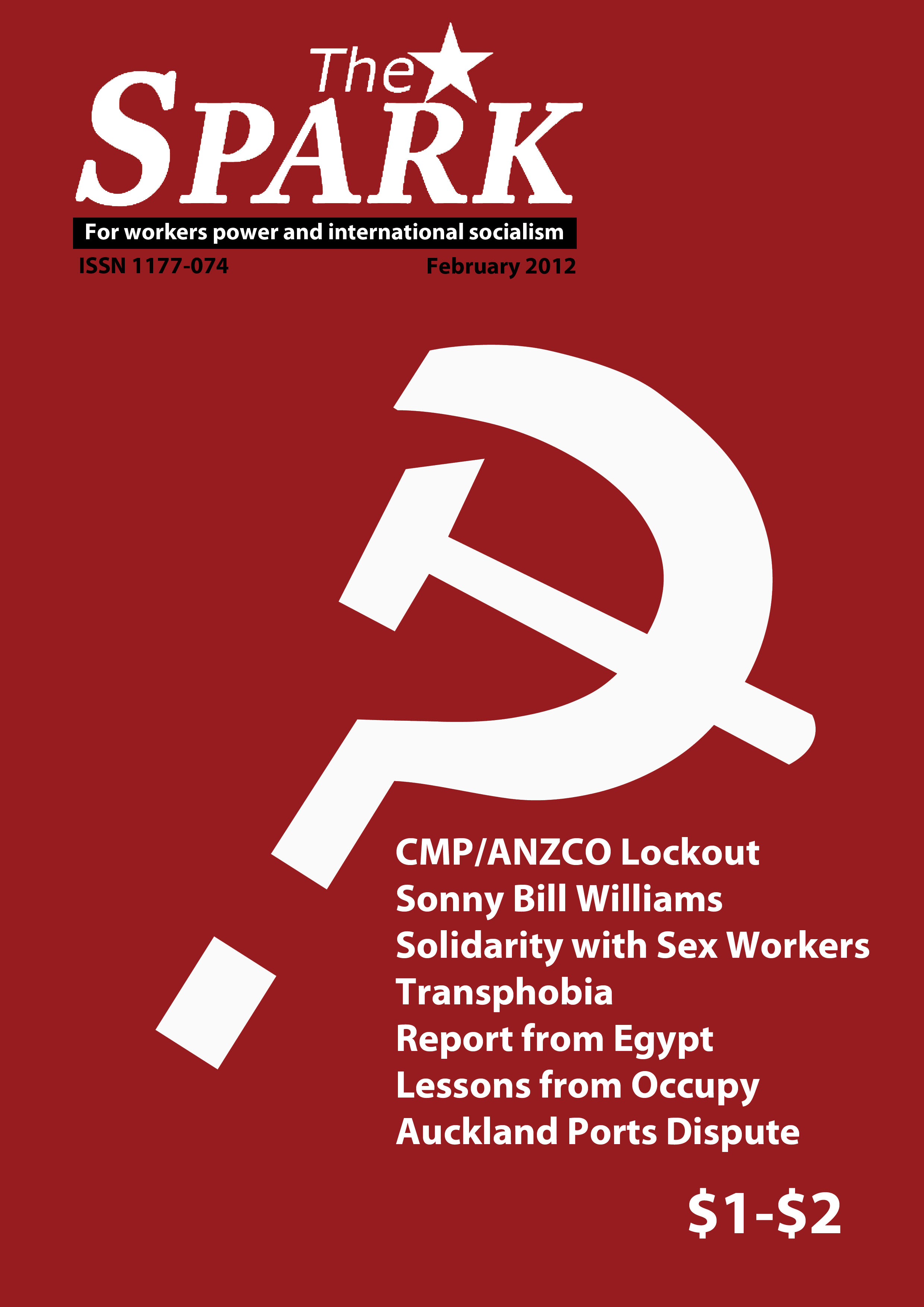 The Spark got a mention in the mainstream media recently when the Waikato Times asked for a comment on a new energy drink from The Spark co-ordinating editor Jared Phillips. The new ‘Seize the Power’ energy drink can features the iconic image of Latin American revolutionary Che Guevara and the slogan ‘energise and revolutionise’.
The Spark got a mention in the mainstream media recently when the Waikato Times asked for a comment on a new energy drink from The Spark co-ordinating editor Jared Phillips. The new ‘Seize the Power’ energy drink can features the iconic image of Latin American revolutionary Che Guevara and the slogan ‘energise and revolutionise’.
The Waikato Times article was not an analysis of how revolutionary imagery has been co-opted for marketing- the ubiquitous Che image is just the most prominent example, see Kiwibank’s ‘join the movement’ ad campaign or the TV commercial that shows a popular uprising by iced tea enthusiasts- but a light piece of filler. One reading the article could come away thinking that this was the most pressing issue for socialists in New Zealand, but rest assured that after this sentence you will find no more mentions of energy drinks in this magazine.
In this issue we reprint an article by Simon Oosterman reporting on the Ports of Auckland strike and then look at how the lockout at ANZCO shows the need for the right to strike. We also have an article about sex work and how it should be looked at by socialists.
Guest writer Nada Tawfeck provides a first-hand account of the situation in Egypt a year after the popular uprising that deposed dictator Hosni Mubarak. Last year those uprsisings spread across the region in what’s now known as the Arab Spring, but the movement didn’t flow south to Africa- until now; a general strike recently took place in Nigeria, spurred by austerity measures that drastically raised the cost of living. We also continue our coverage of the Occupy movement in this country.
The second part of our series by Kelly Pope examining the relationship between work and mental health appears in the second half of the magazine, along with two other theoretical articles, one examining queer oppression with regard to Libra’s commercial featuring a transgender woman, and the other a look at the meaning of Sonny Bill Williams in a sports article by Joel Cosgrove. Of course, theory without practice is a dead end, also in this issue is an ‘activist calendar’ listing.
Notice to readers and subscribers of the Spark
We would like to reassure readers and subscribers of The Spark that the January-December issue has been laid out, but due to a technical issue the December-January issue it couldn’t be printed or uploaded. There will be a smaller run of this issue alongside the February issue of The Spark.
The Spark is made by volunteers and is laid out on a personal computer. We apologise for and regret any inconvenience.
Feb Spark pdf
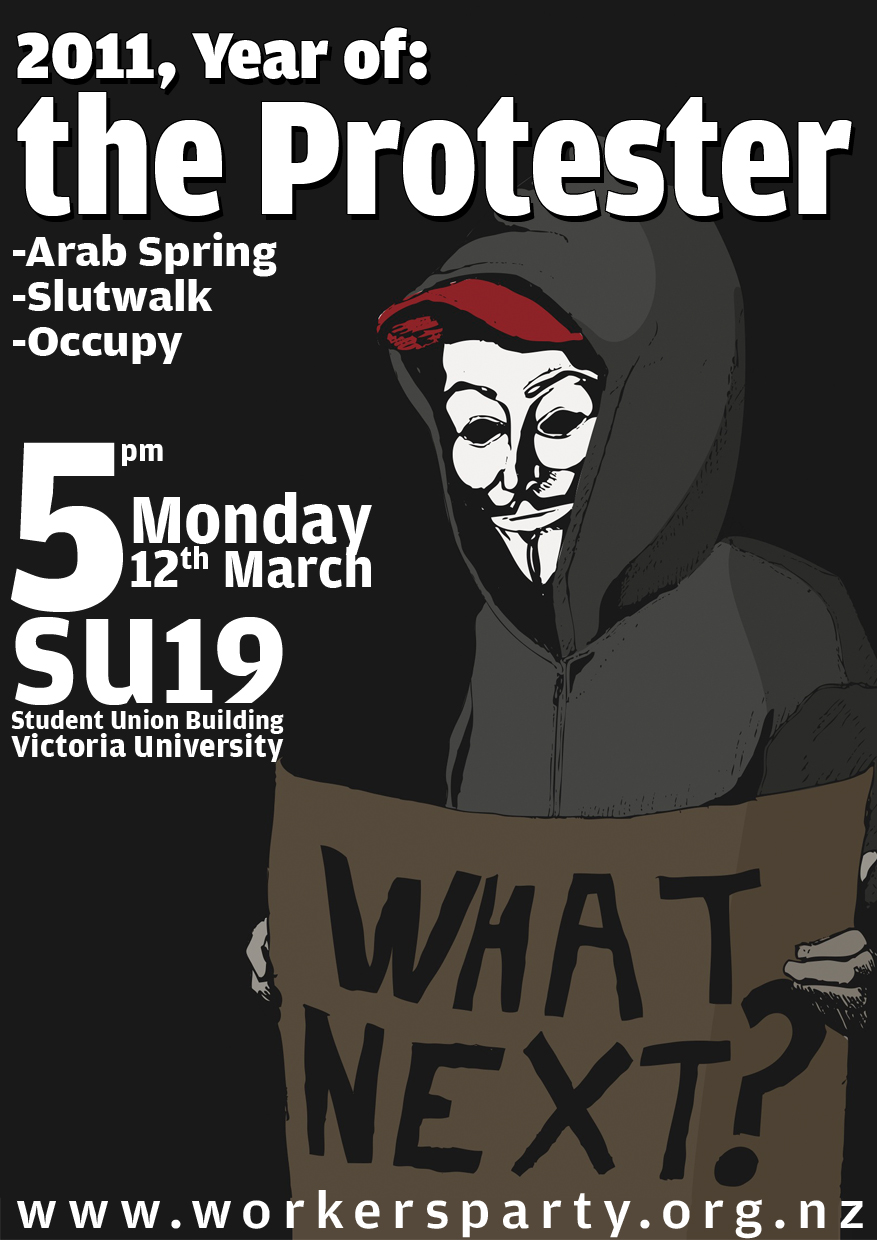 2011 Year of the Protester: What Next?
2011 Year of the Protester: What Next?
5pm, Monday March 12th
SU19, Student Union Building
Victoria University of Wellington
If assets are in private hands, whether foreign or New Zealand owned, they only care about three things – (1) profit, (2) profit and (3) profit.
-Hone Harawira
State-owned enterprises, originally introduced under Rogernomics, are a backdoor to privatisation. Run primarily for profit, they don’t care about:
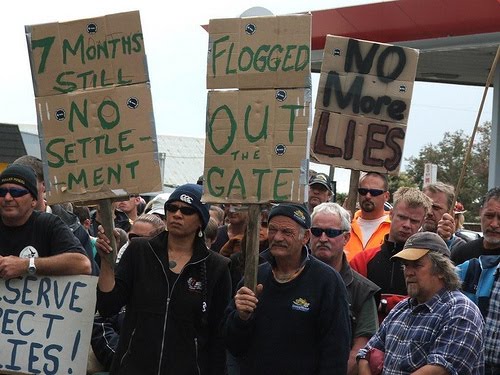
By selling controlling shares in State-Owned Enterprises, National plans to remove further barriers to smooth, unaccountable business operations.
Ombudsman investigation revealed no evidence for National’s claims of a 10% cap on shares held by any one company, or 85-90% control by ’mum and dad’ investors. With greater control by private business, social and ecological impacts will be externalised.
One million non-voters, the lowest turnout since women won the right to vote, is no mandate for this.
Yes to community control
In the short term we must organise to stop asset sales.
In the long term, we need workers’ and consumers’ control of public utilities.
If you agree, get involved.
pdf here
Mike Kay
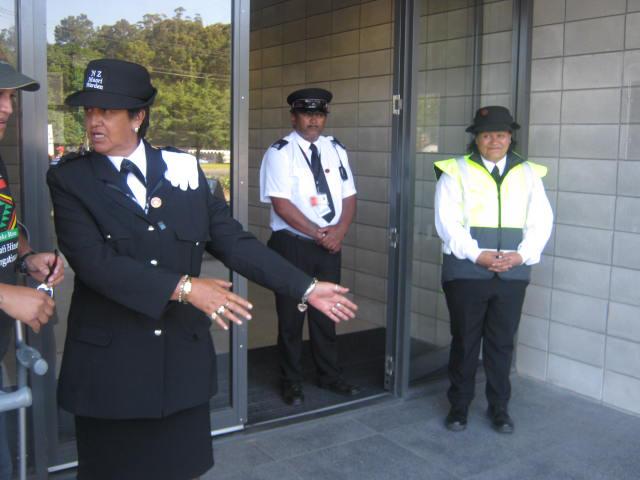 The Auckland Māori consultation hui on state asset sales took place yesterday at Tainui’s Airport Novotel under heavy police and Māori warden presence. The hui revealed universal dissatisfaction from Māori about the government’s plans, but also exposed important class divisions within Māoridom itself.
The Auckland Māori consultation hui on state asset sales took place yesterday at Tainui’s Airport Novotel under heavy police and Māori warden presence. The hui revealed universal dissatisfaction from Māori about the government’s plans, but also exposed important class divisions within Māoridom itself.
In his opening presentation, Minister for SOEs Tony Ryall stated that the controversial Section 9 will stay in the SOE Act, and that the government had “got the message on that.” Section 9 provides that “nothing in this Act shall permit the Crown to act in a manner that is inconsistent with the principles of the Treaty of Waitangi.” Whilst the audience made it clear that Section 9 should also apply to the new legislation enabling partial sell-offs of state assets, the debate that followed rapidly broke out of the bureaucratic parameters that the government had laid down for the hui.
A Mana Movement member asked Ryall what guarantees that, after these sell-offs, the government wouldn’t sell more. His response was that the government only had a mandate to sell a 49% stake in each of the power companies, and the rest of its stake in Air New Zealand. The questioner replied that they were already privatising further by selling off state housing in her neighbourhood of Glen Innes. Ryall reiterated that the general election had given them a mandate, whereupon a Workers Party member interjected that “one million non-voters is not a mandate!”
Continue reading “Auckland hui on asset sales: "One million non-voters is not a mandate"”
If assets are in private hands, whether foreign or New Zealand owned, they only care about three things – (1) profit, (2) profit and (3) profit.

Byron Clark
A large section of the world wide web went dark earlier this year. Websites including Wikipedia (4th most visted site in the world) removed access to content for 24 hours in protest of two bills on their way though the US congress- the Stop Online Piracy Act (SOPA) and the Protect Intellectual Property Act (PIPA). The laws would have given the old entertainment industries, represented by organisations like the Motion Picture Association of America (MPAA) greater control over the internet. Foreign websites accused of copyright infringement could be made inaccessible to American internet users.
The online protest, which prompted a massive amount of lobbying from American citizens (and overseas), was a success, SOPA and PIPA are dead in the water- at least for the time being. Within 24 hours however it seemed as if those two laws had passed and were being enforced- New Zealand Police, colaborating with the American FBI arrested Kim Dotcom, the founder of the website MegaUpload in his mansion north of Auckland. Several other men involved with the site were also arrested. Continue reading “Mega Conspiracy: Kim Dotcom, SOPA and capitalism”
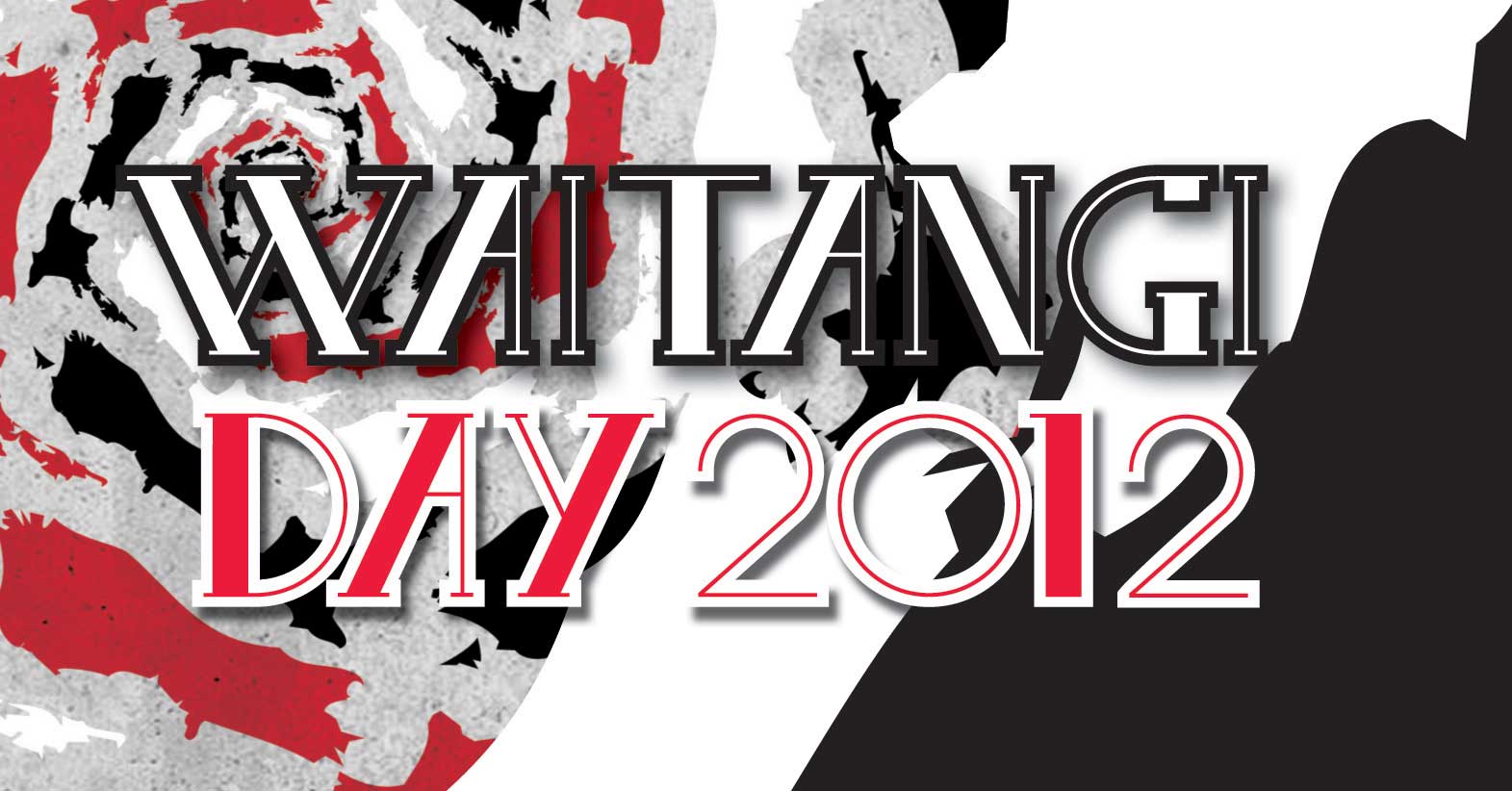 The emergence of the Mana Movement has given an urgency to our drive to renew our perspective on Māori liberation. Furthermore, the departure of the Redline group has given us cause to re-examine our past positions on a number of matters, including indigenous issues. In order for us to begin that work, I have tried to reconstruct those former positions. This was far from easy, since most of the early WP material is no longer available on line, and my personal involvement with the Party was fairly marginal when the Foreshore & Seabed controversy broke. The latter, along with the WP position on the Treaty of Waitangi and Tino Rangatiritanga (TR) form the three topics of this discussion document, since those were the major issues of contention between ourselves, the rest of the left, and the Māori Sovereignty movement.
The emergence of the Mana Movement has given an urgency to our drive to renew our perspective on Māori liberation. Furthermore, the departure of the Redline group has given us cause to re-examine our past positions on a number of matters, including indigenous issues. In order for us to begin that work, I have tried to reconstruct those former positions. This was far from easy, since most of the early WP material is no longer available on line, and my personal involvement with the Party was fairly marginal when the Foreshore & Seabed controversy broke. The latter, along with the WP position on the Treaty of Waitangi and Tino Rangatiritanga (TR) form the three topics of this discussion document, since those were the major issues of contention between ourselves, the rest of the left, and the Māori Sovereignty movement.
I want to begin by acknowledging the specificity of Aotearoa, in that it is unique amongst imperialist countries in having a sizeable indigenous population possessing a significant social weight. This fact is important to Cultural Nationalists as well as Marxists: “Unlike any other indigenous colonized people, the Maori live within white culture. Not on reserves. Not in rural areas. […] This is the Maori radicalizing potential.”[Awatere] Continue reading “The Treaty, The Foreshore & Seabed and Tino Rangatiratanga”
Wellington
Workers Party branch meetings
Tuesdays 6pm
Wellington Peoples’ Centre, contact 022 0351077 to confirm
Urewera Raids: Trial update and public forum
Friday February 3rd, 6pm-8pm
Mezzanine, Central Library
CONTAGIOUS STRIKES: Talk and short film on workers’ struggles in China
Saturday February 4th, 7pm-9pm
46 Frederick Street
Entry by donation
Auckland
Christchurch
Open Air University: A Day of knowledge at Occupy Christchurch
Sunday February 12 10am-6pm.
http://www.occupychristchurch.org